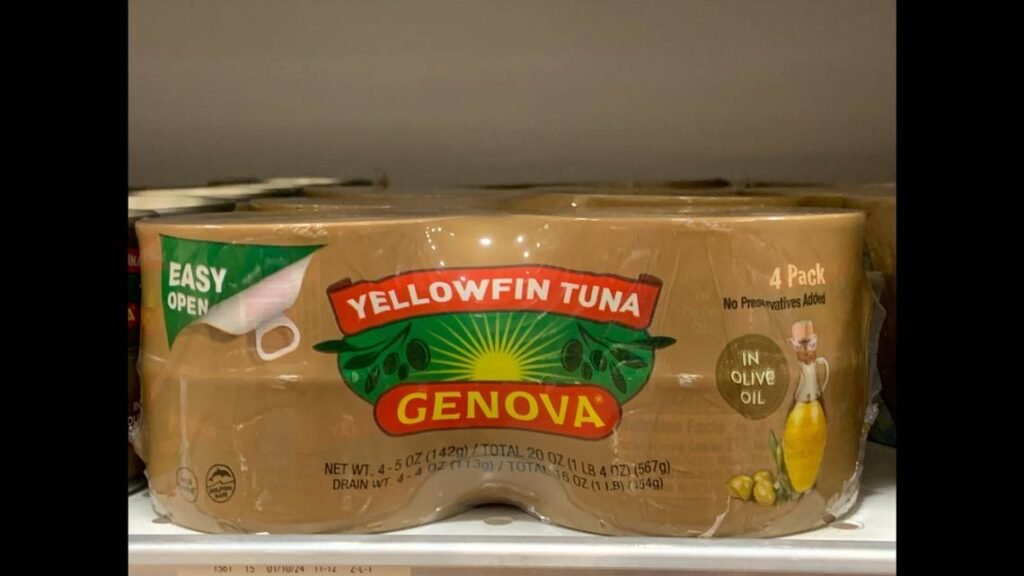Health
Deadly Tuna Recall: Check Your Cans Now!
Tri-Union Seafoods has issued a nationwide voluntary recall of select canned tuna products due to a manufacturing defect that poses a risk of contamination with Clostridium botulinum, the bacteria responsible for botulism, a potentially fatal foodborne illness. The recall affects products sold under the Genova, Van Camp’s, H-E-B, and Trader Joe’s brand names at major retailers across 27 states and Washington, D.C.
What Happened?
The recall, announced on February 7 and publicized by the FDA on February 10, stems from defective “easy-open” pull-tab lids that may compromise the seal integrity of the cans. This defect could lead to leakage or bacterial contamination over time. While no illnesses have been reported so far, Tri-Union Seafoods has taken this precautionary step to ensure consumer safety.
Affected Products
The recalled products include specific lots of canned tuna sold at major retailers like Costco, Trader Joe’s, Walmart, Harris Teeter, Kroger, Safeway, Publix, and H-E-B. Key details include:
- H-E-B Solid White Tuna in Water (5 oz): Sold in Texas.
- Genova Tuna (5 oz and 7 oz): Distributed through Costco in Florida and Georgia and other retailers in multiple states.
- Van Camp’s Tuna: Available at Walmart and independent stores in Pennsylvania, Florida, and New Jersey.
- Trader Joe’s Tuna: Sold in states including New York, New Jersey, Maryland, and Virginia.
Why Is This Dangerous?
Botulism is a rare but serious condition caused by toxins produced by Clostridium botulinum. Symptoms include difficulty swallowing, muscle weakness, blurred vision, slurred speech, and breathing difficulties. If untreated, it can lead to paralysis or death. The CDC warns that foodborne botulism can occur even if contaminated food looks or smells normal.
What Should You Do?
Consumers who have purchased any of the recalled products should take the following steps:
- Do Not Consume: Even if the tuna appears or smells fine.
- Dispose Safely or Return: Return the product to the retailer for a full refund or discard it immediately.
- Contact Tri-Union Seafoods: For assistance with product retrieval or replacement coupons, email support@thaiunionhelp.zendesk.com or call 833-374-0171 (Monday-Friday, 9:00 AM – 5:00 PM EST).

Final Reminder
This recall does not affect other Tri-Union Seafoods products. Consumers are urged to remain vigilant and check their pantry for any canned tuna matching the recall criteria. If you experience symptoms of botulism after consuming these products, seek immediate medical attention.

Bolanle Media covers a wide range of topics, including film, technology, and culture. Our team creates easy-to-understand articles and news pieces that keep readers informed about the latest trends and events. If you’re looking for press coverage or want to share your story with a wider audience, we’d love to hear from you! Contact us today to discuss how we can help bring your news to life
Film Industry
Why Burnt-Out Filmmakers Need to Unplug Right Now

If you’re reading this at 2 AM, scrolling through industry news instead of writing your script, you already know something’s wrong.
You’re not lazy. You’re not untalented. You’re burnt out—and you’re far from alone.

The Numbers Don’t Lie
87% of film and TV workers are facing mental health challenges right now. 62% of creators report burnout, with 65% constantly obsessing over content performance. Even more alarming: 1 in 10 creators experience suicidal thoughts—nearly twice the rate of the general population.
But here’s what the statistics don’t capture: the paralysis. The endless scrolling. The “should I make a feature or pivot to vertical shorts?” loop that keeps you stuck for months. The guilt of watching tutorials instead of shooting. The way political chaos and industry upheaval make creating feel pointless.
The Trap You’re In
You’re waiting. Waiting for the algorithm to make sense. Waiting for the industry to be “fair” again. Waiting for the perfect format, the right budget, the ideal moment when your head is finally clear enough to make something worthy.
That moment isn’t coming.
The filmmakers you admire didn’t wait for perfect conditions. They made their breakthrough films during recessions, pandemics, personal crises, and industry chaos. The only difference between them and you right now? They gave themselves permission to create imperfectly.
Why Now Is Actually the Perfect Time
The industry’s chaos is real, but it’s also created an opening. Streaming platforms are hungry for authentic stories. Independent films are driving growth in the global film market. In 2026, filmmakers with deep trust in a niche have more power than studios chasing mass appeal.
But none of that matters if you’re too exhausted to pick up a camera.

The 3-Day Reset
Here’s what actually helps when you’re stuck:
Day 1: News blackout during creative hours. Not forever. Just when you’re supposed to be creating. The world will still be chaotic tomorrow—but you’ll have protected the only hours that matter for your art.
Day 2: Pick one format. Just one. Feature, shorts, or vertical content—it doesn’t matter which. What matters is ending the analysis paralysis. Your first project won’t be your breakthrough anyway. It’ll be your fifth. So start.
Day 3: Make something imperfect this week. Not good. Not portfolio-worthy. Just made. A 60-second test. A rough scene. Anything that reminds you why you started doing this in the first place.
The Real Problem Isn’t Your Idea
You don’t have a creativity problem. You have an input-overload problem. Your brain is processing election cycles, algorithm changes, industry layoffs, and the constant pressure to “choose the right path” before you’re “allowed” to create.
But creativity doesn’t work on permission slips.
72% of film and TV professionals say the industry is not a mentally healthy place to work. 59% struggle to maintain any work-life balance. 50% face relentless, unrealistic timelines. The system is designed to burn you out.
Your response can’t be to wait for the system to fix itself. It has to be to protect your creative energy like it’s the most valuable resource you have—because it is.
What Happens If You Don’t Reset
The filmmakers who “wait for the right time” never make their films. They become the people who talk about the script they’re “working on” for five years. They’re the ones who know every piece of gear, every distribution strategy, every festival deadline—but have nothing to submit.
Don’t let information replace creation. Don’t let the news cycle steal your narrative.

Start Monday
Not when things calm down. Not when you figure out the perfect format. Not when the industry is “fair” again.
Monday. Imperfectly. With whatever you have.
Your story—messy, unpolished, and made anyway—is what the world needs right now. Not your perfectly researched plan. Not your anxiety about choosing wrong.
Your work.
The filmmakers who win in 2026 won’t be the ones who waited for permission. They’ll be the ones who created despite the noise, shipped despite the doubt, and remembered that done beats perfect every single time.
So take the weekend. Unplug from the chaos. Rest without guilt.
Then Monday morning, make something imperfect.
The industry doesn’t need you to wait until you’re ready. It needs you to start before you feel ready—and figure it out as you go.
That’s not reckless. That’s how every film you’ve ever loved actually got made.
If this hit home, you’re not alone. Thousands of independent filmmakers are choosing to create despite the overwhelm. Start your 3-day reset Monday. Your future self will thank you.
Health
Oral Sex Is Spreading More Than Pleasure — It’s Fueling a Cancer Surge

Once viewed as one of the “safer” forms of sexual activity, oral sex is now under intense scientific scrutiny for fueling a surge in throat cancers caused by the human papillomavirus (HPV). In Texas, where vaccination rates lag behind national averages, the impact is particularly alarming.

Texas at the Center of a Growing Epidemic
According to the Texas Department of State Health Services, nearly 20,000 HPV-associated cancers were diagnosed in the state between 2018 and 2022, with oropharyngeal cancer emerging as the most common among men. The disease affects the tonsils, tongue base, and throat—and it’s overwhelmingly linked to oral transmission of HPV-16, a high-risk viral strain also responsible for cervical cancers.
Specialists in Austin report that HPV-driven throat cancer has risen by more than 225% in recent years, outpacing national growth and surpassing cervical cancer as the dominant HPV-related malignancy in men. These cancers are increasingly affecting younger, non-smoking men—a demographic once considered low-risk.
The Texas Vaccination Gap
While prevention is possible, Texas remains one of the lowest-ranking states in HPV vaccination completion. Data published in JAMA Network Open found that Texas ranks 48th nationwide in completing the HPV vaccine series, with only 16–17% of adolescents fully protected as of 2022. Counties in North Texas report the highest cancer rates alongside the lowest vaccination uptake, a combination experts attribute partly to misinformation and anti-vaccine sentiment.

Changing Faces of Throat Cancer
Unlike traditional throat cancers linked to tobacco and alcohol, HPV-related oropharyngeal tumor cases often appear in otherwise healthy middle-aged adults. Dr. Baran Sumer of UT Southwestern Medical Center explains that these patients often have “no smoking or drinking history” — the virus itself is the culprit.
HPV types 16 and 18 remain the most aggressive, capable of lingering in the throat tissue for years before mutating normal cells into tumors. Men in particular face higher risk: the immunological clearance rate for HPV is slower, allowing infections to persist and increase cancer odds.
Preventing a Preventable Cancer
The HPV vaccine can prevent over 90% of HPV-related cancers, including throat, anal, and cervical cancers. Yet public health leaders warn that adult vaccination rates remain far below the threshold needed to halt transmission. Physicians are calling for stronger awareness campaigns aimed at parents of preteens—especially in underserved Texas regions where education and access remain limited.
The Bottom Line
Oral sex may be common, but the misconceptions around its safety are costing lives. The data from Texas paints a clear picture: as vaccination lags, cancer cases rise. Experts agree that turning the tide will require confronting stigma, expanding education, and recognizing that protecting against HPV is not about morality—it’s about survival.
Health
Nation Split as Luigi Mangione Fights Death Penalty in CEO Murder Case

The case of Luigi Mangione, the 27‑year‑old accused of killing UnitedHealthcare CEO Brian Thompson, has ignited national debate, pitting supporters who see him as a whistleblower against critics who view his actions as an act of cold‑blooded violence. What began as a shocking corporate tragedy in December 2024 has evolved into one of the most polarizing death‑penalty battles in recent U.S. history.

The Killing That Shocked Corporate America
Brian Thompson, a respected CEO and father of two, was gunned down outside the New York Hilton Midtown on December 4, 2024. Surveillance footage reportedly showed a masked gunman lying in wait before firing a 3D‑printed pistol fitted with a silencer. Authorities later identified the suspect as Luigi Mangione, an Ivy League‑educated software engineer from Maryland who had grown increasingly vocal about his resentment toward the health‑insurance industry.
The killing triggered a multi‑state manhunt that ended when Mangione was captured at a McDonald’s in Altoona, Pennsylvania, five days later. Police said they recovered a 3D‑printed weapon and a handwritten letter denouncing “corporate greed” and calling the healthcare system “parasitic” from his backpack.

A Divided Public
Public opinion around Mangione’s motives has since fractured the nation. His supporters—many of whom have donated to his legal defense fund, which has surpassed $900,000—view his actions as symbolic resistance to perceived corporate corruption. Conversely, victims’ rights groups and law‑enforcement advocates argue that painting him as a “folk hero” disrespects the life of an innocent man and glorifies domestic terrorism.
The Legal Fight
Mangione faces federal charges including murder, use of a firearm in a crime of violence, and two counts of stalking. Because of the weapon’s use and the nature of the alleged planning, he could face the federal death penalty. However, his attorneys have filed motions to dismiss the capital charge, arguing that prosecutors violated his constitutional rights by questioning him without reading his Miranda rights and by searching his belongings without a warrant.
Their argument echoes a previous legal victory: in state court, a New York judge dismissed charges that attempted to classify the murder as an act of terrorism. The current federal motion seeks to suppress key evidence—including the weapon—on grounds of unlawful search and interrogation.
Possible Political Overtones
Defense filings have also accused federal prosecutors of turning Mangione into a “pawn” of the Trump administration to demonstrate toughness on violent crime. Attorney General Pam Bondi has publicly stated that seeking the death penalty aligns with President Trump’s directive to “make America safe again,” further intensifying political scrutiny of the case.
What’s Next
The federal court has until October 31 to rule on whether the death‑penalty charge will stand. If the motion fails, Mangione could face trial with the possibility of execution; if successful, the most severe penalty left would be life imprisonment with the chance of parole.
As his case unfolds, the moral and legal tensions surrounding Luigi Mangione reflect deeper American divisions over justice, corporate accountability, and who society chooses to blame—or defend—when outrage turns violent.

 Advice1 week ago
Advice1 week agoHow to Make Your Indie Film Pay Off Without Losing Half to Distributors

 Entertainment4 weeks ago
Entertainment4 weeks agoWhat the Epstein Files Actually Say About Jay-Z

 Film Industry4 weeks ago
Film Industry4 weeks agoAI Didn’t Steal Your Job. It Revealed Who Actually Does the Work.

 Entertainment3 weeks ago
Entertainment3 weeks agoWhat Epstein’s Guest Lists Mean for Working Filmmakers: Who Do You Stand Next To?

 Business2 weeks ago
Business2 weeks agoHow Epstein’s Cash Shaped Artists, Agencies, and Algorithms

 News4 weeks ago
News4 weeks agoCatherine O’Hara: The Comedy Genius Who Taught Us That Character Is Everything

 Business2 weeks ago
Business2 weeks agoNew DOJ Files Reveal Naomi Campbell’s Deep Ties to Jeffrey Epstein

 Film Industry1 week ago
Film Industry1 week agoWhy Burnt-Out Filmmakers Need to Unplug Right Now




































